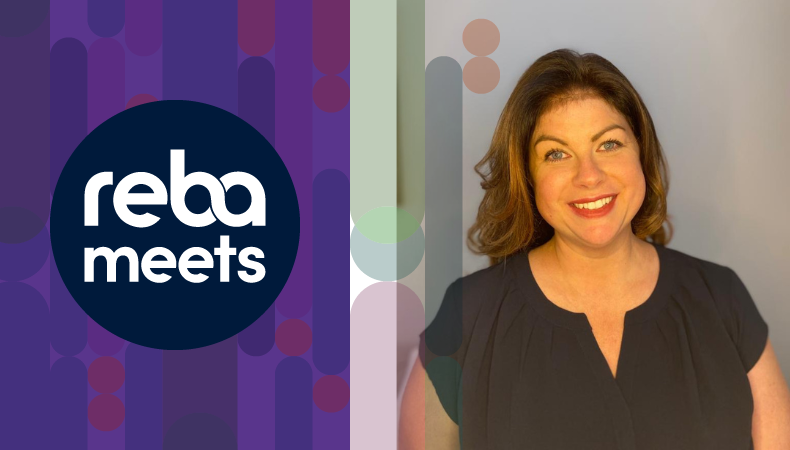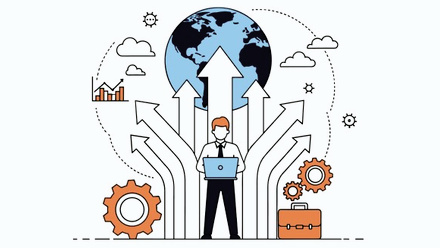From barista to benefits: How Microsoft’s Samantha Sergent carved out a career in international benefits
Growing up in Seattle means being surrounded by breathtaking natural parks, fantastic coffee and the headquarters of one of the most famous tech companies in the world. Yet for Samantha Sergent, working at Microsoft felt like a career for someone else.
After leaving high school following the birth of her first child, Sergent worked in several hospitality jobs across the city before enrolling at college (or university to us Brits) in her late 20s.
She says: “I had a different than standard trajectory out of secondary school. I had a kid, then made changes later in life. I did everything: barista, wait staff, cleaned hotel rooms, cleaned houses, basically any job I could get.”
But after realising she would have to work all the big holidays, and miss out on precious family time, Sergent knew she had to make a conscious choice around how her career was guided. She had always been interested in science, so went back to school to get a degree in Chemistry and Environmental Science.
Re-entering the education system is daunting, but taking this leap of faith after working in hospitality has helped to shape Sergent’s reward and benefits career.
She says: “I had an energy, drove by grit and determination, plus wanting to being a role model to my daughter and showing her sometimes to achieve what we need to do, we need to make sacrifices to make that happen.
“Sometimes I still operate a bit at a level of chaos, it’s how I’m built. When you start working in hospitality, there’s either a customer waiting for you or you have work that must be done. It’s how I learned to work.”
It was Sergent’s connection to customer experience through hospitality which helped land her first job at Microsoft.
She says: “Growing up in Seattle, Microsoft felt like it was something not for me. All of the smartest kids went there, the best of the best, and at that time, it wasn’t how I saw myself.
“But there was definitely a lot of learning, some imposter syndrome, some self-reflection and looking back to realise I should be there.”
Shift into benefits
Sergent has risen through the ranks at Microsoft, tackling transformation projects both in and outside of HR and reward. What began as a quality assurance role shifted into US HR operations and finally developing an international benefits strategy.
She says: “I was the first person to say I’m not the right person for this; I have no benefits experience. But what I did have experience in was understanding operation models, providing structure and seeing the bigger picture.”
Pre 2014, Microsoft had no shared service administration model, and all employee questions, administration and head count took place via local teams – HR, facilities, and office admins.
Sergent and her team moved the admin processes out of individual countries and into a shared services model. But with different suppliers, approaches, plan designs and models, the amount of work was much more than she had anticipated.
“Nobody understood how to scale international benefits or how to define what the strategic operating model should be, and then GDPR hit so nobody could manage what that either, she says. “We went from administration to compliance. We realised we had to put some scale behind it, and that’s where the project really took off.”
She adds: “I didn't realise how much administration happened, how many Excel files were involved, how many people needed to track reimbursements based on emails, we had made a lot of assumptions but our data had never been validated.
“Nor did I know how many really cool benefits we had coming out of corporate that nobody knew about internationally.
“I had a big ‘aha’ moment when I heard from some employees that when they got an email from the standard benefits email address, they assumed it wasn't for them because it was coming from the US.”
Sergent and the team also knew that without a good experience of the new benefits system, employee engagement and take up rates would be low.
She adds: “I had a big learning around what the experience looked like for international employees. If you got into a situation where you needed to use our benefits quickly, whether that’s an insurance situation or a medical diagnosis, it was extremely hard to navigate, almost to the point where it was a little bit embarrassing that that was the process.
“I sat in the US at the time, so my view was the US view, and it was pretty myopic. But being able to get a lense on what the true experience was in the international space and how far we had to go to get to a place of better, helped to shape the strategy.”
Since then, Sergent has moved to the UK to take up the role of EMEA regional benefits manager, of which she rose through the ranks again to become international benefits director. The team now boasts 20 full time employees and a managed service contingent staff group of roughly 15 employees globally.
Changing role of reward and benefits
Reward is now a fundamental part of Microsoft’s business strategy, Sergent argues.
“If you think about reward, it’s your whole package that you get at Microsoft. Whether that’s benefits, stock or the ability to do your role from wherever you want to do your role, she says.
“The exciting thing about the benefits space is where we’ve always relied on compensation and stock to be big levers, we now have benefits as a third lever, and these are all equally important to the employee.
“Compensation is what people will always look at first, but we started to see a shift in feedback through pulse surveys or generalised feedback in how employees were thinking about the whole package- including benefits.
“We’re riding the digital wave and it’s all being led by employee experience, one that we would never have been able to provide five years ago. Salary will always be king, but there’s a big chair at that roundtable of benefits that wasn’t there before.”
Given Microsoft’s strong focus on developing its own version of AI, Co-Pilot, it’s no surprise that Sergent is optimistic about how AI can be utilised in the benefits space.
She says: “The AI pieces that are going to be game changers are those that have already been demonstrated and showcased by benefits. It’s putting benefits at employees’ fingertips when they need them most and having that chat experience to leverage internal documentation around programmes to answer immediate questions.
“When we cross the threshold of using AI to make an employee comfortable and help them and walk them through a whole health scenario, it will be amazing.”
And what’s the secret to Sergent’s successful career at one of the world’s most successful companies? “Don’t fake it until you make it. Instead, be willing to put yourself out there and try different things, she says. “Ask questions, get curious, find coaches and meet mentors.”







